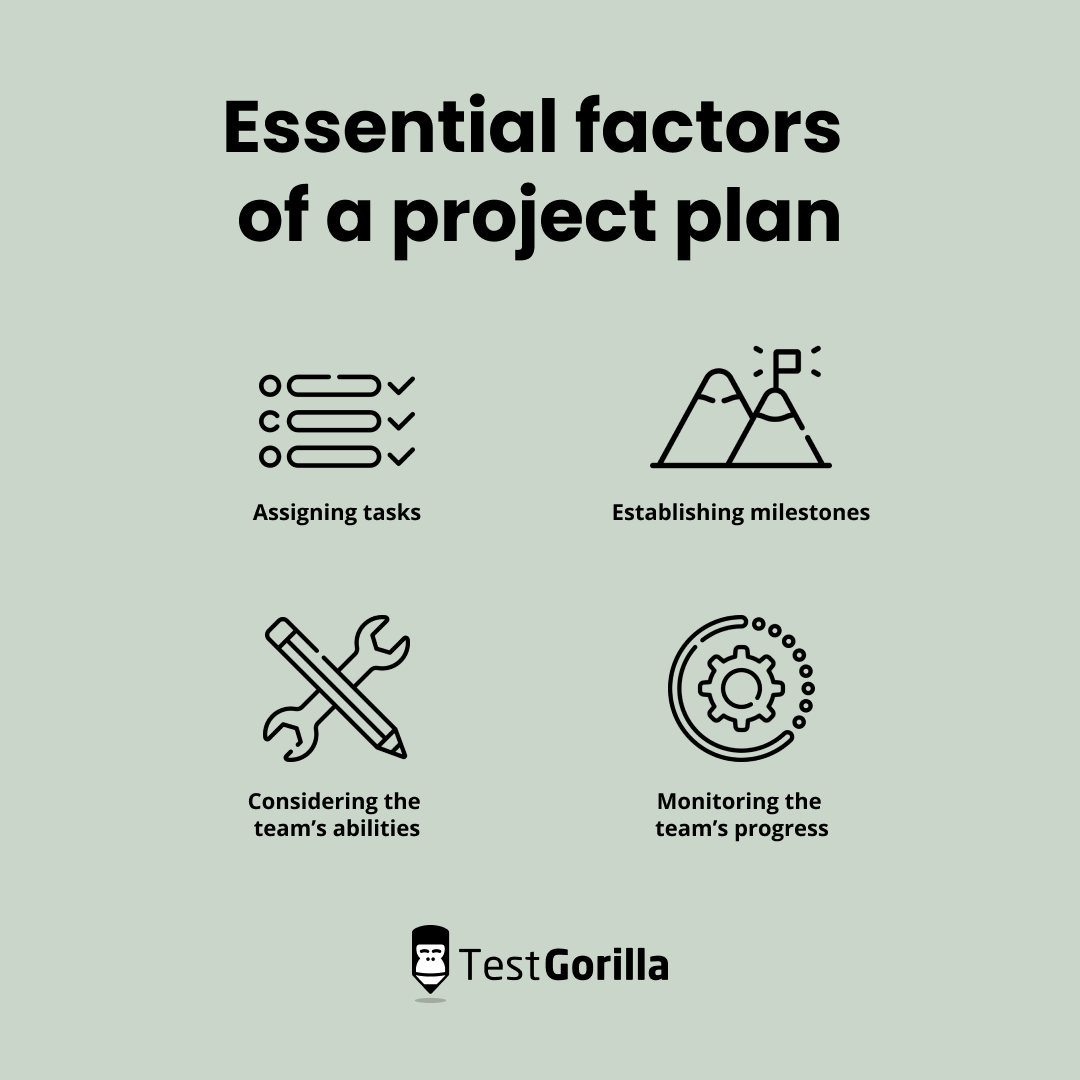You should always complete a thorough candidate evaluation when hiring an IT project manager. From technical skills to management abilities, there are many factors to assess, but it’s worth learning if your applicant’s abilities match your requirements.
How can you evaluate your applicants without wasting time and focusing on the wrong ones?
Fortunately, you can do this by following a simple two-step method. Start by using skills tests, like our software skills or cognitive ability tests, to evaluate your candidates’ technical and soft skills. Then interview the best candidates based on their skills test results.
But what if you need a list of interview questions?
There’s no need to worry if you’re unsure about the lists you’ve found so far. Ask your candidates some of these 20 IT project manager interview questions to assess their experience and knowledge.
Table of contents
20 IT project manager interview questions to assess professionals
These IT project manager interview questions focus on skills, work experience, projects, and traits. Use them in your interview to encourage candidates to share more of their knowledge.
1. Tell us a little bit about yourself.
Asking this IT project manager interview question enables candidates to discuss their work experience and any side projects they’ve completed.The US Bureau of Labor Statistics suggests that companies will require more project management specialists to oversee the increasing number of complex IT projects. If your business falls into this category, it’s best to thoroughly assess your candidates’ experience.Some might mention specific information, such as the highest number of team members they have managed. Others may talk about the reason they became IT project managers. Whatever answer they provide, consider whether their passion and experience match your company and the role.
2. Could you describe your most recent project?
A candidate’s latest projects can tell you a lot about their recent experience. So, instead of only inquiring about their history and experience, it’s worth asking this question to focus on their current knowledge.Candidates might mention a few crucial facts about their projects, including their main goals and the size of the team they managed. They could also talk about their systematic approach to handling the project, such as delegating tasks according to the team’s strengths. Check if these methods or details match your expectations to review your candidates’ responses.
3. Which project management approaches help you complete your projects?
Even though a Project Management skills test will help you understand your applicants’ project management abilities, it’s important to ask them this interview question. In the interview, applicants can give you additional information about their approaches, which will help you ensure they match your expectations.Below are a few examples of project management approaches candidates could use to easily oversee projects:
The critical chain project management method:
This strategy focuses on project resource allocation and distribution. It’s ideal for both large and small businesses.
The extreme programming method:
This approach is ideal for software development projects with short development cycles and frequent complete releases.
The Six Sigma method:
This method requires project managers to identify factors that aren’t working well in the project. It uses quality management and empirical statistics to improve business processes.
4. Has there ever been a time something went wrong in a project you managed?
Setbacks happen frequently in project management, so it’s key to evaluate how candidates respond to project delays or other problems.Top candidates will know that teams can overcome project issues by following a few steps:
Determine what’s gone wrong
Check the project’s original plan
Consider new strategies to solve the issue
Liaise with the client to tell them about the problem
Review the team’s work processes
Implement the new strategies
Don’t forget to ask follow-up questions to check if these approaches helped the team complete the project successfully.
5. Talk to us about your best project. Can you explain what made it successful?
No two top IT projects will be identical, so you can expect each applicant to provide a unique response to this IT project manager interview question. However, many elements can make a project successful, so it’s worth considering if they are important for your company’s projects.Candidates might discuss a few factors, such as meeting deadlines, successfully sticking to a budget, or incorporating a change that improved the project. Look for responses that indicate their management was important to the project’s success.
6. Budget management skills are vital for IT project managers. Can you explain why?
The most straightforward response to this question is that budgeting can ensure the project manager knows the amount they can spend on any part of the project. Budget management is crucial for quality control and successful outputs.Candidates should talk about their budget management experience and any of their successes related to budget planning. The top answers will match your candidates’ Budgeting skills test results and prove their expertise.For example, if they have managed a flat-fee project, consider if they could:
Create a project plan
Assign tasks to each employee
Specify the number of hours expected for the tasks
Establish internal rates for each project resource
Consider budgets for activities that usually exceed cost estimates
Work out an estimate at completion cost (EAC)
Calculate a payment schedule
Track metrics for performance
7. Tell us the most important elements of a project plan.
There are a few critical elements of project plans that most IT project managers should understand. Here are some examples of essential factors candidates might mention:
Assigning tasks
Establishing milestones
Considering the team’s abilities
Monitoring the team’s progress
Candidates who want to provide a more in-depth response will elaborate on these factors and explain why they’re important. For instance, monitoring the team’s progress and using metrics like quality and satisfaction or productivity can ensure there are no project delays or declines in productivity.
8. Do you have a strategy to create a collaborative environment in your team?
Since studies have shown that workers persevere on challenging projects and tasks 48% longer when working in a collaborative environment, it’s a good idea to check if project manager candidates can encourage this work setting and style.
Many methods can foster a collaborative atmosphere. Candidates might:
Use icebreakers in meetings to encourage team members to share ideas
Incorporate collaborative tools to make communication easier
Encourage team members to ask questions when they don’t understand a concept
The easiest way to review these responses is to ensure the methods applicants describe match your organization’s practices. However, candidates might mention a few unique methods that could enhance your collaborative environment and improve productivity. Therefore, try to be open-minded and consider new ideas.
9. Could you name three tools you prefer to use when planning projects?
Many project planning tools are on the market, and applicants should have experience using them. From RACI charts and Trello to Asana and Kanban boards, each project planning tool can enhance project workflows in different ways.It’s a good sign if candidates can describe the main features of some of these tools and provide examples of how they have enhanced their work. For example, they may prefer to use Kanban boards to help teams visualize projects. They may also know that each card represents a task and that employees can easily check the due date and status of the task.
10. How would your stakeholders or senior managers describe your leadership skills?
Leadership skills are non-negotiable for IT project managers since they must lead teams. A report by the Project Management Institute found that 65% of organizations prioritize these skills because they make it easier for project managers to efficiently coach, motivate, and manage employees.
Ideally, your applicants’ senior managers will praise their leadership skills, but it’s always important to ask for examples that support these claims.
Other ways to verify your candidates’ leadership abilities include completing a reference check to confirm their manager’s evaluation and using a Leadership & People Management skills test before the interview.
With these methods, you can get more details about your candidates’ skills. For example, skills test results will tell you if candidates can provide timely feedback and support their team members’ career progress.
11. A team member requires extra time to complete a task. How would you handle this?
Top IT project managers know how to support team members who can’t complete tasks by the deadline. They should want to discover why the employee encountered challenges and consider a few methods to handle any setbacks. To ensure the team member completes the task with the right help, they might:
Ask another team member to help with the project
Incorporate time buffers in the original project plan
Negotiate with senior management or stakeholders for extra time
Time management is an essential skill for IT project managers, so don’t overlook the importance of testing this ability with a Time Management skills test before you hire someone.
12. Do you have any approaches for handling difficult stakeholders?
Some stakeholders can be challenging to handle, but it’s often necessary if IT project managers need to get unique insights into a project or issue. Therefore, it’s best for your candidates to know how to get their stakeholders’ support.
How they do this can help you determine if they’re a good match for your business. For example, some applicants may negotiate with their stakeholders for financial and decision-making support. Others might keep all lines of communication open and prefer to find out the factors that motivate them to adhere to their requirements.
Negotiating with stakeholders can be vital. So, if you’ve found it difficult to gauge your candidates’ negotiation skills and need more information, don’t forget to use our Negotiation skills test before you interview them.
13. Could you name three methodologies you use to manage IT projects?
This IT project manager interview question lets you dig deeper into your applicants’ knowledge of common project management methodologies. The methodologies they mention will vary depending on their company’s preferred approach, but you should still expect candidates to know a few alternative methods.
Some IT project method management methods include the following:
Waterfall
Agile
Lean
But it’s not enough for applicants to list these methods. Consider if they also know some advantages of using them.For instance, with the Agile framework, candidates can measure their team’s performance and notice any setbacks. They can also make data-driven choices to correct common issues.
14. What is your ideal project? Describe what projects you prefer to work on.
It’s common for IT project managers to have preferences regarding the projects they work on, and each applicant will likely provide a different answer to this question.
For example, a candidate might prefer a complex software programming project in which they produce an application for their company’s stakeholders. Others might enjoy team projects intended for client use.
Candidates could also mention a couple of other factors to elaborate on their ideal project. They might provide information about the budget, timeline, requirements, and feedback required to make the project successful.
This can help you determine if your business can offer projects the candidate is passionate about, which is an easy way to check if they’re a good match for your role.
15. Can you describe a time your communication skills helped you manage a project?
Communication skills are indispensable for project management, and applicants should have plenty of examples of when these skills facilitated project management.
For instance, IT project managers can use written and verbal communication skills to share facts about the project and even explain technical information to non-technical stakeholders.
These skills also help applicants understand and interpret written documents sent by team members, making it easier to understand their messages and give them the correct support.
Since communication skills are crucial for project managers, testing them is essential. If your candidate has good verbal and written skills, you’ll know it from their Communication skills test results.
16. Do you have any criteria for prioritizing project tasks? Tell us about them.
Task prioritization ensures the project stays on track and helps IT project managers know which resources teams need and how to stick to a budget.
Below are some of the crucial criteria your applicants may use to prioritize tasks:
Check how important the task is to the project’s success
Consider if the task is time-sensitive
Determine if the task has any dependencies
Candidates should also explain more about prioritization and tasks or mention that the higher the task’s priority, the earlier the team should complete it.
Task delegation and prioritization are part of project and people management, so it’s a good idea to use a Project Management skills test to determine whether the candidate can complete these duties effectively.
17. How do you know when an IT project is falling behind schedule?
This IT project manager interview question relates to project methodology and leadership. Your candidates’ responses will reveal how they notice when a project isn’t on track to meet a deadline.
One approach they may apply is using the Agile methodology. This strategy ensures that team members get regular feedback after quality assurance processes are complete. This approach keeps project managers informed about the status of a project and whether it’s going according to plan.
But there are other ways to know if a project is falling behind schedule. The IT project manager may notice that the team has failed to complete tasks or receive feedback about insufficient resources or time to complete the project.
18. How do time-management skills help you get IT projects back on track when delayed?
Although the average worker wastes three hours daily, time-management skills can ensure that teams complete IT projects even if delayed. An IT project manager who plans projects, establishes milestones, and monitors their team’s progress can keep IT projects on track.
The following are a few other benefits of time management:
Stress reduction
Greater productivity
Reduced procrastination
Considering these advantages, it’s important to check if your applicants have the right time-management skills for your team. You can check this with our Time Management skills test.
19. Can you tell us a bit about your remote team management experience?
Remote management experience is key if your company uses a hybrid or fully remote working model. Most IT project managers have experience with remote team management or understand how it differs from traditional management.
Some candidates will know that video conferencing, screen sharing, and Agile meetings can make remote team management easier. Others will provide more in-depth answers and list examples of video conferencing tools they have used.
Even so, you should ensure their remote work experience matches your organization’s expectations before hiring a new employee.
20. Have you ever worked with team members who performed below their potential?
From getting to know their team members to assigning them the correct tasks to rewarding good work, there are many ways IT project managers can ensure team members perform to their full potential.
Candidates might also explain how they use one-on-one meetings to ensure their team members work efficiently. Or they might use communication skills to specify a project’s requirements and ensure nothing hinders the team’s productivity and performance.
When should HR professionals use IT project manager interview questions?
At TestGorilla, we recognize that interviews are essential to the hiring process. Still, it’s always best to use IT project manager interview questions after you ask candidates to complete skills tests.
The moment you get your applicants’ skills assessment results, you can make a shortlist of experienced candidates. Those candidates will always have the best skills – you’ll know this from their test results. So, what does this approach help you achieve?
Using skills assessments after candidate sourcing can help you to:
Reduce the chances of mis-hires
Make the best choice between two experienced IT project managers
Forget resume screening
Mitigate unconscious bias
You can then interview candidates to get to know them better and learn about their traits and skills. Combine skills assessments with interviews to find an expert quickly.
Hire pros with IT project manager interview questions and skills assessments
If you’re eager to hire professionals, you can assess them with our best IT project manager interview questions. But don’t forget to visit TestGorilla to find skills tests to include in your candidate assessments.
Pick five tests, such as our cognitive ability tests, add them to your assessment, and choose custom questions – this is the simplest, fastest way to create a candidate shortlist.
If you’re wondering why TestGorilla is number one for efficient hiring methods, check out our case studies to learn how we’re helping companies find the right experts. Then, why not register for a demo to learn more about our platform?
Hiring professionals doesn’t have to be complex. TestGorilla makes it easy – just use our tests for efficient, bias-free hiring.
Related posts
Hire the best candidates with TestGorilla
Create pre-employment assessments in minutes to screen candidates, save time, and hire the best talent.
Latest posts
The best advice in pre-employment testing, in your inbox.
No spam. Unsubscribe at any time.

Hire the best. No bias. No stress.
Our screening tests identify the best candidates and make your hiring decisions faster, easier, and bias-free.
Free resources
This checklist covers key features you should look for when choosing a skills testing platform
This resource will help you develop an onboarding checklist for new hires.
How to assess your candidates' attention to detail.
Learn how to get human resources certified through HRCI or SHRM.
Learn how you can improve the level of talent at your company.
Learn how CapitalT reduced hiring bias with online skills assessments.
Learn how to make the resume process more efficient and more effective.
Improve your hiring strategy with these 7 critical recruitment metrics.
Learn how Sukhi decreased time spent reviewing resumes by 83%!
Hire more efficiently with these hacks that 99% of recruiters aren't using.
Make a business case for diversity and inclusion initiatives with this data.




















